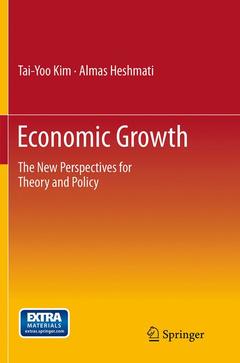Description
Economic Growth, Softcover reprint of the original 1st ed. 2014
The New Perspectives for Theory and Policy
Authors: Kim Tai-Yoo, Heshmati Almas
Language: English
Subjects for Economic Growth:
Approximative price 105.49 €
In Print (Delivery period: 15 days).
Add to cartPublication date: 09-2016
Support: Print on demand
Approximative price 105.49 €
In Print (Delivery period: 15 days).
Add to cartPublication date: 12-2013
323 p. · 15.5x23.5 cm · Hardback
Description
/li>Contents
/li>Biography
/li>Comment
/li>
Tai-Yoo Kim is a Professor of Economics at the Department of Industrial Engineering, Seoul National University, Republic of Korea. He received his Ph. D. in Economics from Colorado School of Mines; his M. A. from West Virginia University; and his B. E. in Mineral and Petroleum Engineering from Seoul National University. He was a post-doctoral research fellow at Columbia University, after which he became an Assistant Professor at IONA College in New York. He also served in the office of the President of the Republic of Korea as an Advisor in Information, Science and Technology. While natural resources economics is his major academic background, Kim's research interests include energy and resources, information and high technology industry, and industrial policy. His most recent publications focus on the economic growth theory, which he validates through skillful analyses of European history and the transmission of hegemony. Currently, Tai-Yoo Kim is investigating government policies that would promote a shared economic growth, to foster a peaceful and prosperous global economy in the future.
Almas Heshmati is Professor of Economics at Department of Economics, Sogang University. He held similar positions at Korea University, Seoul National University, University of Kurdistan Hawler, RATIO Institute (Sweden) and MTT Agrifood Research (Finland). He was Research Fellow at the World Institute for Development Economics Research (WIDER), The United Nations University during 2001-2004. From 1998 until 2001, he was an Associate Professor of Economics at the Stockholm School of Economics. He has a Ph.D. degree from the University of Gothenburg (1994), where he held a Senior Researcher position until 1998. His research interests include applied microeconomics, globalization, development strategy, efficiency, productivity and growth with application to manufacturing and services. In addition to more than 100 scientific journal articles he has published 16 books on EU L
Shows the limitations of current theories on economic growth in their contribution to actual economic growth
Presents a proper and effective theory on economic growth for countries and leaders looking to promote economic growth
Centered around the theory of economic growth and national development for countries pursuing industrialization and development

